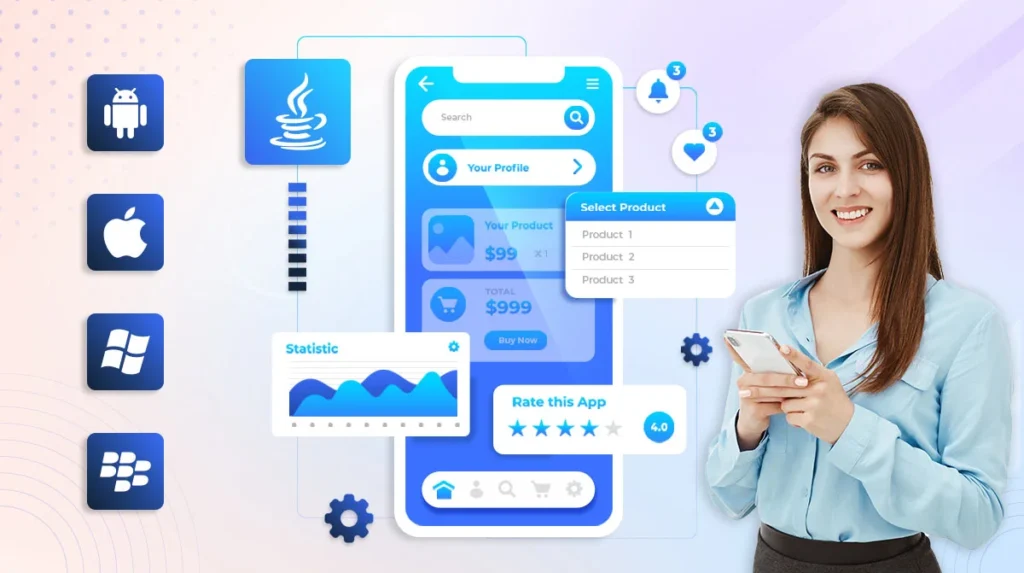As mobile phones became more common and development accelerated, applications evolved at an equal pace. Early applications presented information based on the user’s input. However, many modern apps may offer users information before they are requested to do so.
The Statista report shows yearly app revenue has surpassed $111 billion. Furthermore, the number of Play Store and App Store applications has skyrocketed. The mobile app creation process involves observing new trends and cutting-edge technologies.
According to 2024 projections, there are around 7.1 billion app users globally. Every smartphone user has loaded around 35 applications on their devices.
A few years ago, notions from science fiction films and literature began to become a reality in a variety of fields. AR, VR, ML, and the IoT are revolutionizing processes and reshaping industries.
Mobile App development has rapidly evolved over the past few decades, with Java playing a pivotal role in its growth. As one of the most versatile and widely adopted programming languages, Java has maintained its relevance by offering robust cross-platform compatibility, platform independence, and an extensive library ecosystem.
While primarily known for its dominance in Android development, Java’s adaptability allows developers to build mobile applications that can function seamlessly across various platforms, making it the go-to choice for many mobile app developers.
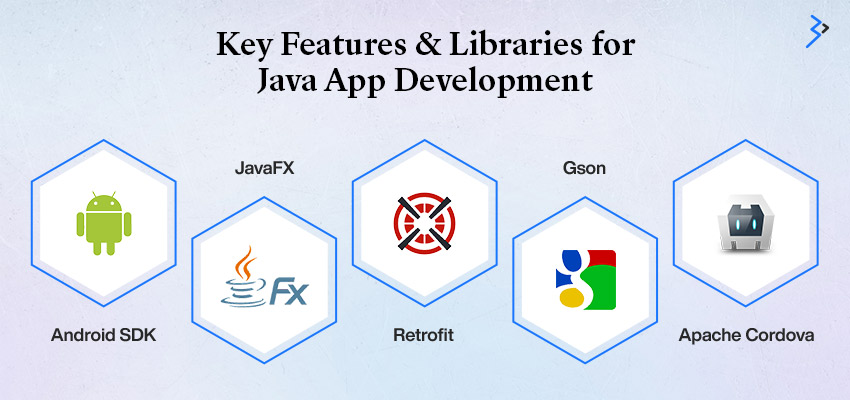
What is mobile app development with Java?
Java is a high-level programming language allowing developers to build secure, portable, scalable applications. It has remained a cornerstone in mobile app development due to its ability to simplify the development process through reusable code and its integration with various modern mobile frameworks. Over the years, Java’s prominence has increased because of its ability to address complex mobile app development challenges, making it a reliable choice for creating mobile apps for Android and beyond.

Key Aspects of Java in mobile app development:
- Cross-Platform Compatibility: Java’s “write once, run anywhere” philosophy allows developers to create mobile apps that work seamlessly across multiple platforms.
- Extensive Libraries and APIs: Java provides many libraries and APIs that simplify the development of feature-rich mobile applications.
- Strong Community Support: With decades of active developer engagement, Java boasts one of the largest and most knowledgeable communities, providing ample resources for troubleshooting and innovation.
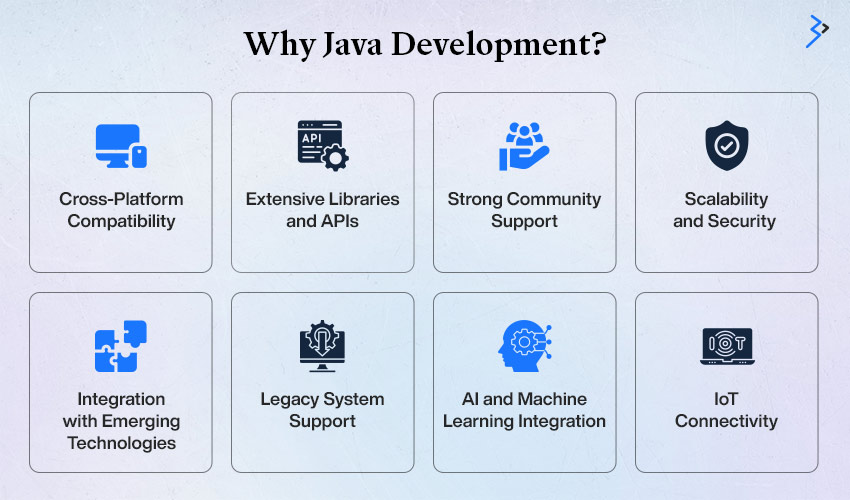
Why Java Remains Relevant in mobile app development?
Java’s continued dominance in mobile app development can be attributed to its stability, performance, and ability to evolve with emerging technologies. Even as new languages and frameworks emerge, Java adapts, maintaining its position as a go-to tool for mobile developers.
Key Reasons Java Stays Relevant:
- Continuous Evolution: Java consistently evolves to meet new industry trends, adding features like lambda expressions and modules for better modular programming.
- Integration with Emerging Technologies: Java easily integrates with new technologies like IoT, blockchain, and AI/ML frameworks, allowing developers to keep pace with cutting-edge innovation.
- Legacy System Support: Many enterprises still rely on legacy systems, and Java allows developers to maintain and modernize them without a complete rewrite.
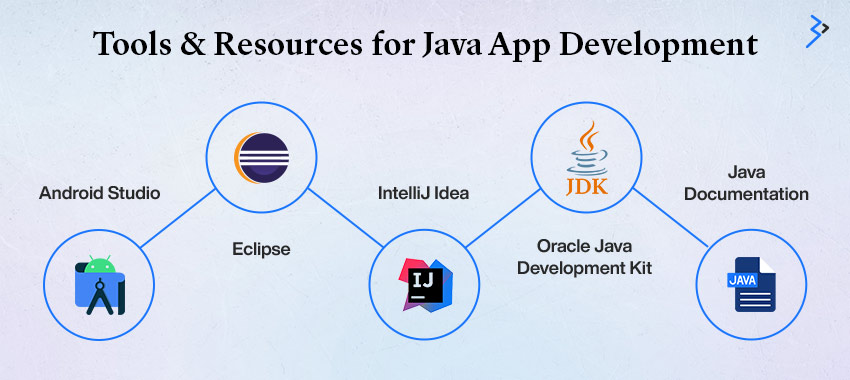
The Future of Mobile Apps with Java
As mobile technology evolves, Java is set to integrate more seamlessly with disruptive technologies such as Artificial Intelligence (AI), the Internet of Things (IoT), and blockchain. Its versatility ensures that developers can adapt to these technologies while maintaining a stable codebase.
Key Trends Shaping the Future:
- AI and Machine Learning Integration: Java’s established frameworks will facilitate the inclusion of AI/ML features into mobile applications, enabling personalized experiences, predictive analytics, and smart automation.
- IoT Connectivity: Java’s platform independence makes it ideal for IoT-enabled mobile apps, allowing devices and sensors to communicate and share data in real time.
- Blockchain for Enhanced Security: With increasing data security and privacy concerns, blockchain technology integrated with Java will revolutionize how mobile applications handle transactions and data storage.
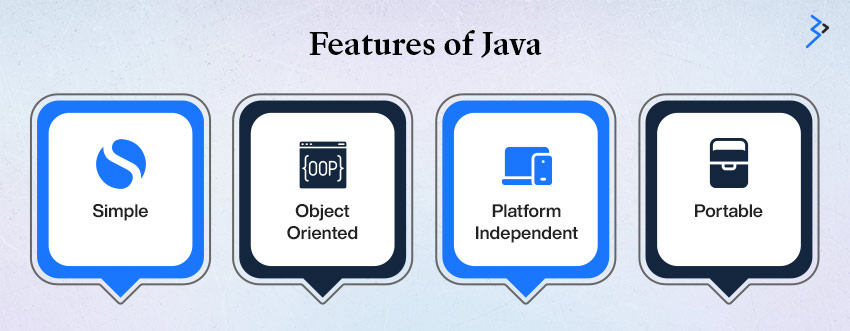
Advantages of Using Java in Mobile App Development
Java’s appeal extends beyond its long history; it offers tangible advantages that mobile developers continue to leverage in their projects today.
- Cross-Platform Development: Java’s ability to build apps that function on multiple platforms (primarily Android) without substantial rewrites makes it invaluable for businesses looking to reach wider audiences.
- Scalability: As user bases grow, Java’s robust architecture allows developers to scale applications efficiently, ensuring they perform optimally under increased loads.
- Security: Java’s built-in security features, including its comprehensive access control functionality, ensure that mobile apps are equipped to handle sensitive user data securely.
Java vs. Other mobile app development Languages
Although newer languages like Kotlin and Swift, as well as frameworks such as Flutter, have gained traction in mobile app development, Java remains a strong contender due to its unique advantages.
Cross-Platform Support
Java offers extensive and well-established cross-platform support, especially with Android development, making it a go-to language for developers looking to build applications that function across multiple devices. While other languages, such as Kotlin, offer cross-platform capabilities, the range and maturity of Java’s ecosystem remain unmatched. Swift, being native to iOS, lacks the cross-platform flexibility Java provides.
Performance
Java’s performance, particularly in Android development, is considered high. As the native language for Android, Java applications perform exceptionally well in this environment. Kotlin, also designed for Android, offers comparable performance, but Java’s long history gives it an edge in optimization and stability. Flutter, which relies on Dart, offers solid performance but may require more tuning for complex applications.
Community Support
Java boasts a large and active community that has been built over decades. This extensive support network makes troubleshooting, finding resources, and learning the language more accessible for developers. Kotlin’s community is growing, but it’s still relatively small compared to Java. Similarly, Swift and Flutter have rapidly expanding user bases but have yet to reach Java’s global scale.
Security
Java includes built-in security features, making it a preferred choice for applications requiring robust security protocols. While other languages like Kotlin and Swift offer security measures, Java’s security architecture’s maturity level makes it a reliable option for handling sensitive mobile data.
Case Studies – Real-World Applications of Java in mobile app development
1. Elevating Manufacturing Efficiency with Java-driven IIoT Integration for Grandiose
Grandiose sought to enhance its manufacturing process by implementing an Industrial IoT (IIoT) system for real-time monitoring and predictive maintenance. Through better data insights, the goal was to reduce equipment downtime and improve product quality.
Grandiose’s production lines were equipped with Java-based IIoT solutions to streamline sensor data collection and analysis.
Leveraging Java’s capacity to manage vast datasets and process them in real time, the system provided instant insights into equipment performance. Predictive maintenance algorithms, also developed in Java, analyzed sensor data to forecast machinery breakdowns, enabling the team to address issues before they escalated.
As a result, Grandiose experienced a 30% reduction in unplanned downtime, leading to smoother production workflows and enhanced product quality. The combination of Java’s scalability and ability to integrate seamlessly with IIoT devices was critical in optimizing operational efficiency.
2. Enhancing Manufacturing Efficiency with Real-Time Monitoring and Predictive Maintenance
United Pharmacy needed a real-time monitoring system with predictive maintenance capabilities for its production facilities to reduce downtime and increase efficiency. To improve operational performance, the goal was to implement an IIoT-driven solution using Java.
United Pharmacy integrated Java-powered IIoT systems into its manufacturing processes, allowing real-time visibility across all production lines. With Java’s performance capabilities, the system could collect, process, and analyze large volumes of sensor data, enabling predictive maintenance. This approach identified potential equipment issues before failure, reducing downtime by 25%.
Java’s scalability allowed the system to adapt as production needs increased, boosting production efficiency by 20%. United Pharmacy improved production processes and achieved significant cost savings due to fewer interruptions in manufacturing operations.
3. Boosting Manufacturing Efficiency with Java-Powered IIoT for Jazeera Paints
Jazeera Paints aimed to enhance manufacturing efficiency using a Java-based IIoT solution for real-time equipment monitoring and predictive maintenance.
By leveraging Java’s versatile libraries and performance features, Jazeera Paints integrated sensors into its production lines to monitor equipment in real-time.
Java’s robust data-handling capabilities allowed the system to process sensor data efficiently, providing insights that enabled predictive maintenance. As a result, the company saw a 30% reduction in downtime and a 25% improvement in product quality. Additionally, automating monitoring tasks using Java solutions increased overall production efficiency, allowing Jazeera Paints to meet market demands more effectively.
Frequently Asked Questions (FAQs)
1. Why choose Java for mobile app development?
Java offers cross-platform compatibility, a vast library ecosystem, and strong community support, making it an ideal choice for mobile app development.
2. Is Java still relevant in 2024 for mobile apps?
Absolutely. Java’s continuous evolution ensures its relevance by adapting to emerging technologies and maintaining legacy system support.
3. What are the challenges of using Java in mobile app development?
While Java is widely used, challenges include managing memory in mobile environments and the steep learning curve for new developers.
4. How does Java compare with Kotlin for Android development?
Kotlin is a modern alternative to Java for Android development, offering more concise code. However, Java remains a strong choice due to its maturity, stability, and extensive library support.
5. What are the future trends in Java mobile app development?
Java will likely see deeper integration with AI, blockchain, and IoT technologies, further cementing its role in mobile app development.
6. What are the advantages of using Java for cross-platform mobile app development?
Java’s “write once, run anywhere” feature allows developers to build applications that function seamlessly across different platforms, reducing development time and cost.
7. How can developers ensure the performance and scalability of Java-based mobile applications?
Developers can leverage Java’s robust architecture, frameworks, and best practices to optimize performance and ensure scalability, such as through modular programming and efficient memory management.
How Can You Start Developing Mobile Apps with Brainvire’s Experts?
Are you interested in using Java’s power for mobile app development? Java offers a solid foundation for building robust, secure, scalable mobile applications. Whether you’re developing for Android or other platforms, Java’s vast array of tools and strong community support make it a great choice.
Start your mobile app development journey today by exploring Java’s libraries, frameworks, and development environments, or talk to an experienced Brainvire team that can help you with Mobile App Development Services. Not sure where to start? Learn how to hire mobile app developers to build your dream team and start projects smoothly.
Wrap Up
Java continues to dominate the mobile app development landscape, offering unparalleled advantages in cross-platform compatibility, security, scalability, and adaptability to modern technologies like AI, IoT, and blockchain.
Its large community support, extensive libraries, and stable nature make it a preferred language for developers looking to create innovative, future-proof mobile applications. The future of mobile app development with Java looks bright, and businesses that choose Java today are setting themselves up for long-term success.
Related Articles
-
Top 10 Questions to Ask When Hiring PhoneGap Development Company
Are you planning to get an app built for your business? Are you planning to target a large number of audiences? Are you thinking to get a PhoneGap app developed?
-
Create Your Own Social Media App: A Step by Step Guide for Business Owners
Have you considered creating a social media app? If you’re already using social media networks in your business, then developing your own social network app will be a great addition.
-
How To Get Started With On Demand App Services
Talking About How To Get Started With On Demand App Services, There are mobile app develpement companies that offer on-demand services at customer’s conditions. They are always looking forward to

